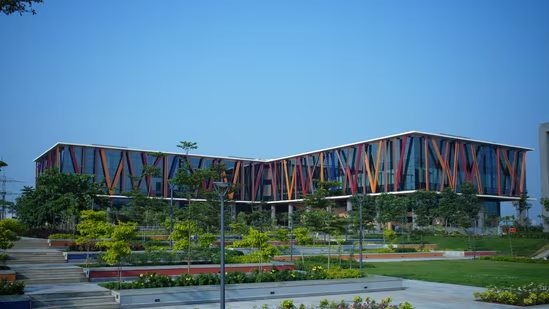By Nilesh Mathur
Updated on: Jun 06, 2025 12:42 pm IST
The Centre was born from a long-standing issue that continues to erode public trust—namely, the overwhelming backlog and inefficiencies in our legal system. In response to India’s mounting judicial backlog and a legal system often seen as slow and opaque, BITS Law School—under the aegis of BITS Pilani—recently launched the PALETTE Centre (Professional Advancement in Law Through Executive Training & Technical Education) in collaboration with PanScience Innovations. Headquartered in Mumbai, the Centre seeks to integrate AI, modern tools, and executive skilling into the legal ecosystem. In this exclusive conversation with Hindustan Times Digital, Dr. Ashish Bharadwaj, Founding Dean of BITS Law School, explains how PALETTE aims to bridge the gap between technology and justice, rebuild public trust, and prepare legal professionals to lead the transformation, rather than be disrupted by it.
What was the need for establishing the PALETTE Centre?
The Centre was born from a long-standing issue that continues to erode public trust—namely, the overwhelming backlog and inefficiencies in our legal system. People’s faith in justice is shaped by how accessible, timely, and transparent the process feels. Unfortunately, that’s often not the case.
We all know about the pendency crisis and the shortage of judges. When a judicial system in a democracy is overburdened, it undermines public confidence in democratic processes themselves. That’s where PALETTE comes in—with the goal of introducing systemic, technology-driven solutions that reduce delays, improve accessibility, and rebuild trust.
We’re deeply aligned with the vision laid out by Chief Justice Chandrachud and others who’ve advocated for using technology to make courts more efficient, affordable and accessible. PALETTE isn’t just about legal tech—it’s about capacity-building across the entire legal ecosystem, from judges and court staff to litigators, law professors, and even non-law students.
So you mean ‘justice delayed is justice denied’?
Delay is a factor, but it’s far from the whole picture. If the legal process is opaque or frustrating, people lose confidence, regardless of whether the verdict was just. The journey matters.
At PALETTE, we’re trying to change that journey. Our goal is to break the inertia in the system, where things are done just because that’s how they’ve always been done. Through skilling, technology, and new thinking, we want to move the legal system into the 21st century.
There’s a lot of concern about the role of AI in the legal profession. What’s your take?
That’s a crucial question. Let me answer in two parts.
First, as a faculty member, I’m averse to the idea of introducing AI too early in a student’s life—say, in middle or high school. Early tech exposure, especially through social media, has already shortened attention spans and weakened critical thinking. In fact, Oxford’s Word of the Year in 2024 was “brain rot”—a reflection of this growing concern.
AI should enter the picture between undergraduate and postgraduate levels, when students are cognitively ready. Learning is sequential, and rushing that process can do more harm than good.
Now, as a researcher in intellectual property and patent law, I see how AI can be a game-changer. For instance:
- Predictive analytics can forecast outcomes in straightforward cases.
- E-filing automation can cut out hours of repetitive data entry.
- Defect analysis tools can identify red flags in documents.
- Case summarisation can make legal information comprehensible for the public.



%201.svg)